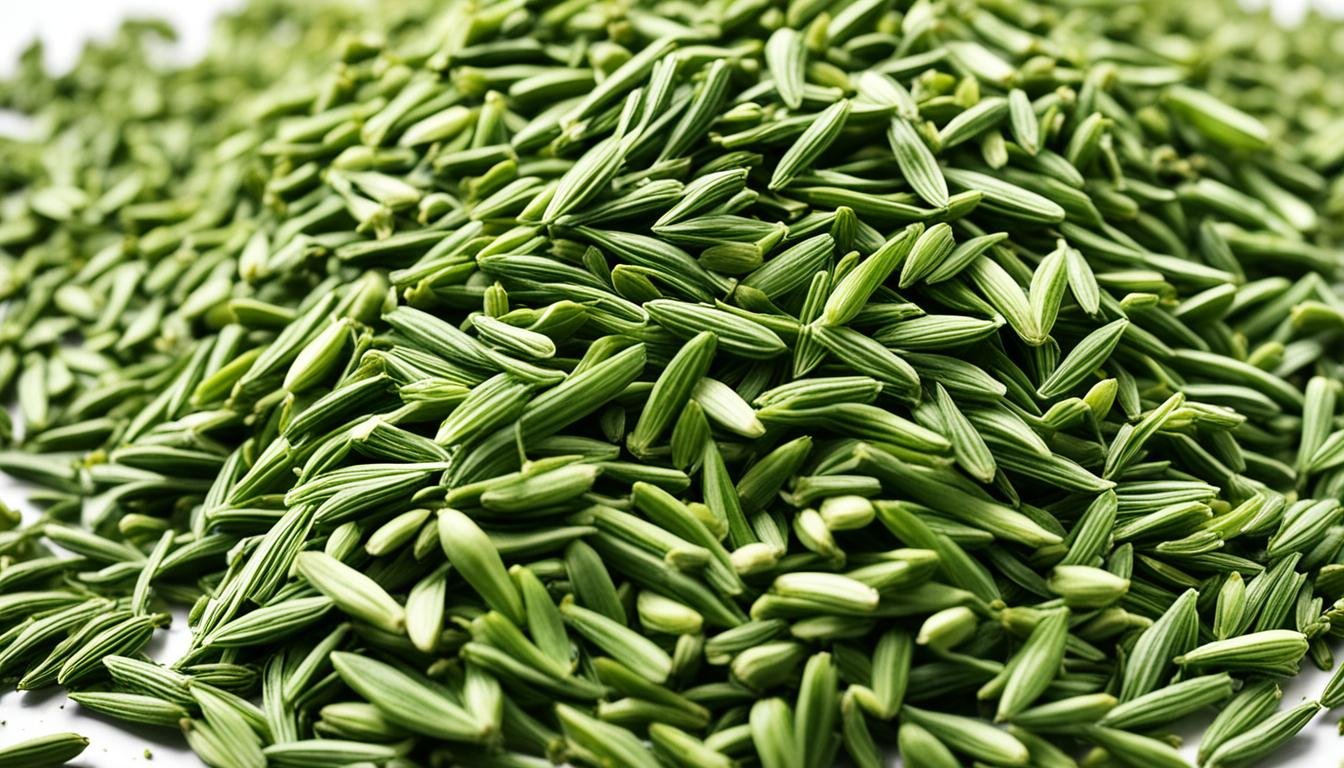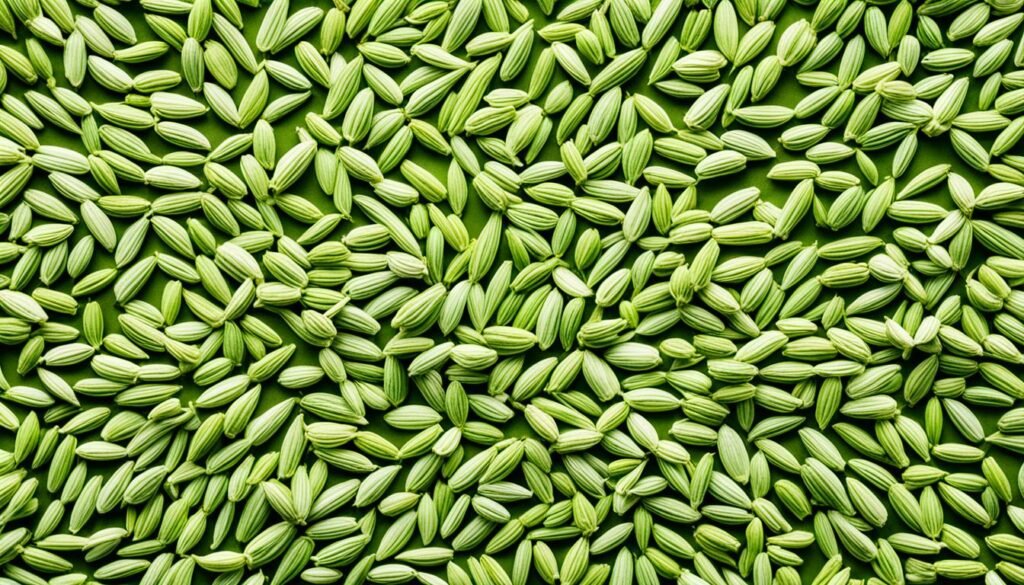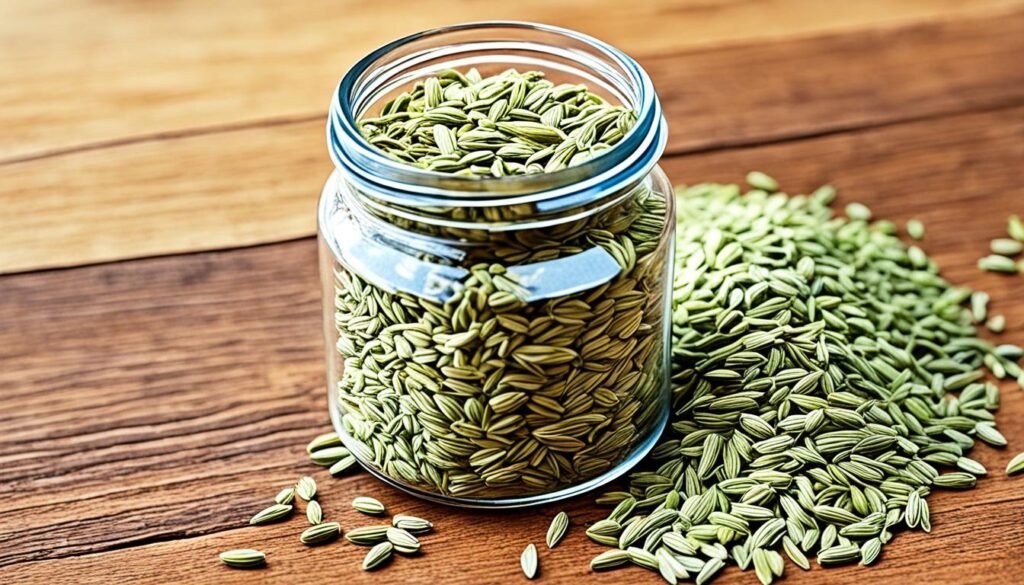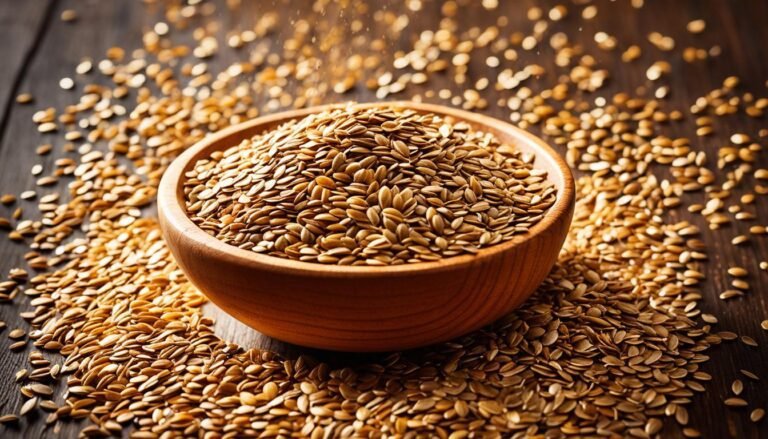Fennel Seeds for Constipation: Natural Relief

Can a simple spice solve your digestive problems? The humble fennel seeds for constipation might be the answer you’ve been looking for. It’s packed with fiber and has special properties. These make it a trusted remedy in traditional medicine for constipation and gut health.
So, why are fennel seeds great for easing constipation? Find out in this article. Learn about the science behind their benefits. Also, see how you can add them to your daily life for natural relief.
What are Fennel Seeds?
Fennel is a plant in the parsley family, known for its yellow flowers. Its leaves are feathery, and the whole plant smells aromatic. The seeds are the most used part for cooking and medicine.
Different Parts and Uses of Fennel
Fennel seeds are long and thin, often pale green or brown. They taste and smell like sweet licorice. People use them in curries, stews, bread, desserts, and drinks.
The bulb can be eaten raw or cooked. The flowers add a light flavor to dishes.
Appearance and Flavor of Fennel Seeds
Fennel seeds are long and pale green or brown. They have a sweet, licorice-like taste and smell. Chefs use them in curries, stews, baked goods, desserts, and drinks.

Fiber-Rich Fennel Seeds for Digestive Health
Fennel seeds are a great choice for boosting your digestive health. A single tablespoon of them gives you about 2 grams of fiber. This is more than what you get from an apple, which has 3-4 grams. Experts say you should aim for 25-30 grams of fiber daily, making fennel seeds a smart choice.
The fiber in fennel seeds helps keep your digestive system running smoothly. It makes your stool bulkier and helps with watery diarrhea. This means you won’t have loose or runny bowel movements. It also helps with constipation and keeps your digestive tract working well.
Fennel seeds are packed with antioxidants like rosmarinic acid and quercetin. These help fight cell damage and lower the risk of chronic diseases. They also have antimicrobial and anti-inflammatory properties, which support your digestive health.

Adding fennel seeds to your meals is a simple way to improve digestion. You can use them in cooking or make a soothing tea. Just remember to talk to your doctor before adding them to your diet if you’re on any medications.
Antimicrobial and Anti-Inflammatory Properties
Fennel seeds are more than just tasty in food. They have strong antimicrobial and anti-inflammatory properties. These properties help ease digestive issues like constipation. Anethole, a key compound in fennel seeds, is behind these health benefits.
Beneficial Components in Fennel Seeds
Studies show that fennel seeds fight bacteria and reduce inflammation. For example, a 2017 study found anethole in fennel seeds can stop cancer cells from growing. Another study in 2017 showed that fennel seed extracts work against harmful bacteria like Escherichia coli and Staphylococcus aureus.
Fennel seeds are also known for their anti-inflammatory effects. A 2010 review looked into traditional Iranian medicine for inflammatory bowel disease. It suggested fennel seeds could help manage these conditions. A 2018 study found a special fennel extract improved life quality for people with irritable bowel syndrome (IBS).
| Study | Year | Key Findings |
|---|---|---|
| “Anethole Inhibits The Proliferation Of Human Prostate Cancer Cells Via Induction Of Cell Cycle Arrest And Apoptosis” | 2017 | Anethole, the main compound in fennel seeds, can inhibit the proliferation of human prostate cancer cells. |
| “Screening, Purification and Characterization of Anionic Antimicrobial Proteins from Foeniculum Vulgare” | 2017 | Fennel seed extracts demonstrated antimicrobial properties against pathogens like E. coli and S. aureus. |
| “A review of the efficacy of traditional Iranian medicine for inflammatory bowel disease” | 2010 | Fennel seeds may have beneficial effects in managing inflammatory bowel diseases. |
| “Efficacy of bio-optimized extracts of turmeric and essential fennel oil on the quality of life in patients with irritable bowel syndrome” | 2018 | A combination of fennel and turmeric extracts improved the quality of life in IBS patients. |
These studies show fennel seeds could be a natural way to help with digestive problems. Their compounds, like anethole, might ease constipation, food poisoning, and inflammatory bowel disorders.

Muscle-Relaxing Effects on the Intestines
Fennel seeds have amazing muscle-relaxing properties that help with constipation. They have antispasmodic qualities that soothe the muscles in the gut. When you have constipation, these muscles can spasm, causing pain and making it hard to go to the bathroom.
Fennel seeds can relax these muscles. This helps the gut work normally again, making bowel movements easier.
For people with irritable bowel syndrome (IBS), fennel seeds are a big help. Fennel seeds can lessen IBS symptoms like stomach pain, bloating, and changes in bowel habits. This is because they relax the muscles in the intestines. This leads to bowel movements that are more regular and less painful.
| Study | Findings |
|---|---|
| Global prevalence of and risk factors for irritable bowel syndrome | Fennel seeds can help reduce the severity of IBS symptoms, including abdominal pain, bloating, and altered bowel habits. |
| Tolerance for rectosigmoid distention in irritable bowel syndrome | Fennel’s antispasmodic effects can help relax the intestinal muscles, allowing for more regular and comfortable bowel movements. |
| Activation of the mucosal immune system in irritable bowel syndrome | Fennel seeds can help reduce the severity of IBS symptoms, including abdominal pain, bloating, and altered bowel habits. |
Adding fennel seeds to your diet or taking them as a supplement can ease constipation and IBS symptoms. They help relax the muscles in your intestines. Try different ways to add these seeds to your daily meals for better digestion.

fennel seeds in constipation
Fennel seeds are a great way to fight constipation naturally. They are full of fiber, which makes stool bigger and softer. They also have properties that help reduce inflammation and relax muscles in the gut.
For those with constipation, fennel seeds are a big help. Their fiber absorbs water, making stool easier to pass. The seeds also have compounds that lessen inflammation in the intestines, helping with constipation.
Fennel seeds have anethole, a substance that relaxes digestive muscles. This can stop spasms that make constipation worse. It helps make bowel movements regular and more comfortable.
Adding fennel seeds to your meals is an easy way to fight constipation. You can drink fennel tea, add the seeds to food, or take supplements. This ingredient is versatile and can help you feel better.
| Nutrient | Amount per 100g |
|---|---|
| Calories | 345 |
| Dietary Fiber | 39.8g |
| Iron | 18.5mg |
| Vitamin C | 21mg |
| Potassium | 1680mg |
Fennel seeds are packed with nutrients and help with constipation. They are a natural way to keep your digestive system running smoothly. Adding fennel seeds to your diet can make a big difference in your health.
How to Use Fennel Seeds
Fennel seeds are great for better digestion and helping with constipation. You can use them in many ways, like making fennel seed tea or adding them to your favorite dishes. These seeds are easy to use and can really help your digestion.
Preparing Fennel Seeds for Cooking and Tea
To make fennel seed tea, use 1 teaspoon of crushed or ground seeds in a cup of hot water. Let it steep for 5-10 minutes. You can add honey to sweeten it.
For cooking, use 1 teaspoon to 1 tablespoon (2 to 6 grams) of whole, dried seeds. Crush or grind them right before adding to your dish. This helps release their oils and flavor. Fennel seeds go well with many dishes, both savory and sweet.
Incorporating Fennel Seeds into Recipes
- Sprinkle fennel seeds over baked goods like breads, muffins, or crackers for a subtle licorice-like taste.
- Add fennel seeds to soups, stews, and sauces to enhance the overall flavor profile.
- Toss fennel seeds into salads, either whole or crushed, for a crunchy and flavorful addition.
- Incorporate fennel seeds into marinades or rubs for meats, poultry, or fish dishes.
- Use fennel seeds to infuse oils and vinegars for dressings, dips, and other culinary applications.
Exploring how to use fennel seeds can open up a world of natural digestive relief and flavor. Whether you like drinking fennel seed tea or adding the seeds to your recipes, these ingredients are great for your gut health and well-being.
Fennel Seed Supplements and Dosage
Fennel seeds are not just for cooking; they come in supplement form too. One brand suggests taking 3 capsules (480 milligrams) daily. Always read the label and talk to a doctor before starting any new supplements, especially if you’re on other meds or have health issues.
Fennel seeds are packed with good stuff like essential oils and nutrients. These can help with digestion, reduce swelling, and even help with breastfeeding or menopause symptoms.
Even though fennel is safe, it can cause some side effects like diarrhea or allergic reactions. It might also affect how certain medicines work. Always check with a doctor before taking it, especially if you have health problems.
| Fennel Seed Supplement Form | Typical Dosage Range |
|---|---|
| Capsules | 3 capsules (480 mg) per day |
| Essential Oil | 0.1 to 0.6 mL per day |
| Extract (Oral) | 200 mg per day |
| Extract (Vaginal Cream) | 5 g per day |
The right amount of fennel seed can change based on what you’re using it for and your health. Always talk to a healthcare professional to find the best and safest dose for you.
Potential Side Effects and Precautions
Fennel seeds are great for health, but knowing their side effects and precautions is key. They have strong essential oils that can cause problems if eaten too much. Here are some things to watch out for with fennel seeds.
Allergic Reactions to Fennel Seeds
Some people might be allergic to fennel seeds, especially if they’re allergic to other carrot family plants like celery or mugwort. Signs of an allergy could be skin issues, stomach problems, or breathing trouble. If you react badly to fennel seeds, stop using them and see a doctor.
If you’re pregnant or breastfeeding, be careful with fennel seeds. Their safety in these cases isn’t clear. Talk to a healthcare provider before adding them to your diet.
Also, people on blood thinners or with bleeding disorders should be careful with fennel tea. It might affect how well blood clots.
If you have health issues or are on meds, always talk to a healthcare professional before eating fennel seeds.
Knowing about the fennel seed side effects and fennel seed allergic reactions helps you enjoy this herb safely. This way, you can get the most out of its benefits while keeping your health first.
Other Natural Remedies for Constipation
Besides fennel seeds, there are many other natural ways to ease constipation. Eating foods high in fiber, drinking plenty of water, and enjoying warm drinks can help. These methods can make bowel movements more regular.
Fiber-Rich Foods for Bowel Regularity
Eating more fiber-rich foods can make your stools softer and help you go to the bathroom more often. Great options include:
- Apples
- Pears
- Blackberries
- Raspberries
- Whole grains
- Pulses (beans, lentils, peas)
Hydration and Warm Beverages
Drinking enough water helps soften your stools and aids digestion. Warm beverages like herbal tea can also ease constipation. Here are some good choices:
- Lemon juice
- Olive oil
- Prune juice
- Ginger tea
If constipation doesn’t get better with these remedies, see a healthcare professional. They can check for other issues.
Conclusion
Fennel seeds are a natural way to help with constipation. They are full of fiber, which makes stools bigger and helps you go to the bathroom regularly. These seeds also have properties that can calm the digestive system and boost gut health.
Adding fennel seeds to your meals, as tea, or as supplements can ease constipation. But, remember to talk to a doctor first, especially if you have health issues or take other medicines.
Fennel seeds are great for constipation because they are high in fiber and support digestion. They can help people with chronic constipation naturally. By knowing how fennel seeds work and how to use them, you can keep your bowel movements regular and healthy.
FAQ
What are the health benefits of fennel seeds?
Fennel seeds offer many health benefits, like easing gas and constipation. They are full of fiber, with about 2 grams per tablespoon. This fiber helps with constipation by making stools bulkier and preventing diarrhea.
These seeds also have properties that fight bacteria and reduce swelling in the intestines. This can help get rid of gas and soothe the intestines.
What is fennel and what do fennel seeds look like?
Fennel belongs to the parsley family and is known for its yellow flowers. Its leaves are feathery, and the plant smells aromatic. Fennel seeds are long and thin, often pale green or brown.
They taste and smell sweet, like licorice. This flavor makes them great for many dishes, from curries to desserts.
How much fiber do fennel seeds contain?
A tablespoon of fennel seeds has about 2 grams of fiber. This is more than an apple. Fiber is important for a healthy diet, helping with digestion and preventing constipation.
What are the antimicrobial, antifungal, and anti-inflammatory properties of fennel seeds?
Fennel seeds have compounds that fight bacteria, fungi, and inflammation. This can help with digestion issues and reduce swelling. Anethole is the main component with these benefits.
How do fennel seeds help relieve constipation?
Fennel seeds relax the intestines, easing constipation. They have antispasmodic qualities that calm down spasms in the gut. This helps restore normal gut function and promotes bowel movements.
Are fennel seeds an effective natural laxative for constipation?
Yes, fennel seeds are a natural laxative for constipation. Their fiber helps bulk up stools and treat diarrhea. They also reduce inflammation and improve gut function, leading to better bowel regularity.
How can you use fennel seeds to help with constipation?
You can use fennel seeds in many ways for constipation relief. For tea, use about 1 teaspoon of crushed seeds. For cooking, add 1 to 1 tablespoon of whole seeds to your dishes.
This releases more oils and flavor. Fennel seeds can be added to many foods, like baked goods and salads, for a sweet taste.
What is the recommended dosage for fennel seed supplements?
Fennel seed supplements come in capsule form. A recommended dose is 3 capsules (480 milligrams) daily. Always follow the label instructions and talk to a healthcare professional before starting supplements, especially if you have health conditions or take other medications.
Are there any potential side effects or precautions with fennel seeds?
Fennel seeds have strong oils that can cause side effects if taken in large amounts. High doses may affect female hormones in mice, but this is unclear for humans. Some people may be allergic to fennel seeds.
More research is needed on fennel seeds’ effects. Pregnant or breastfeeding women should avoid fennel seeds. Always consult a healthcare professional before adding supplements to your diet.
What other natural remedies can help with constipation?
Other natural remedies for constipation include fiber-rich foods like apples and whole grains. Drinking plenty of water and warm beverages like herbal tea can also help. Options like lemon juice, olive oil, prune juice, and ginger can aid in bowel regularity.
If constipation persists, it’s best to see a healthcare professional.






